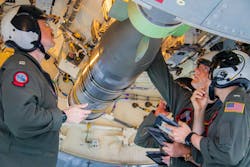Navy asks Progeny Systems for upgrade kits to improve anti-submarine hit performance of MK 54 torpedo
WASHINGTON – Undersea warfare experts at Progeny Systems, a General Dynamics Mission Systems business in Manassas, Va., will build kits to upgrade the MK 54 lightweight hybrid torpedo for surface ships and aircraft under terms of a $139.2 million contract announced in December.
Officials of the Naval Sea Systems Command in Washington are awarding Progeny Systems to produce MK 54 Mod 1 lightweight torpedo kits and test equipment, spare parts, engineering, and hardware support. This contract has options that could increase its value to $808.6 million.
Anti-submarine weapon
The MK 54 Mod 1 is the newest version of the Navy's MK 54 Lightweight Torpedo, which is the primary anti-submarine warfare (ASW) weapon for U.S. surface ships, fixed-wing aircraft, and helicopters. The MK 54 combines the advanced sonar transceiver of the MK 50 torpedo with the legacy warhead and propulsion system of the older MK 46. The MK 54 Mod 1 is scheduled for operational test and evaluation in 2020.
The MK 54 works together with the analog or digital combat control systems and software variants installed on all ASW fixed-wing aircraft, helicopters, and surface ship ASW torpedo tubes and rocket launchers. MK 46 and MK 50 torpedoes are converted to an MK 54 via an upgrade kit.
The MK 54 is for shallow-water environments and in the presence of countermeasures. It uses an expandable open-architecture system, and combines software algorithms from the MK 50 and MK 48 torpedo programs with commercial off-the-shelf technology.
Mission commanders employ naval surface ships and aircraft equipped with the MK 54 torpedo for offense when deployed from fixed-wing aircraft and helicopters, and or defense from surface warships.
Improved hit performance
The Navy developed the MK 54 Mod 1 upgrade to improve the MK 54’s hit performance by increasing the torpedo’s sonar array from 52 to 112 elements, providing higher resolution. Software upgrades are to improve target detection and enhance false target rejection.
The new torpedo's 112-element hydrophone front end, new processors, and new software are to improve the munition's detection, classifier, and tracker performance for use on surface ships and aircraft. The MK 54 Mod 1 torpedo is for use in open-ocean deep water and for shallow-water littoral environments against fast deep-diving nuclear submarines and slow-moving quiet diesel-electric submarines.
The MK 54 has better performance than the Mark 46 in shallow-water, and reduces the costs of the Mark 50 torpedo with commercial off-the-shelf (COTS) components. Navy submarines use advanced versions of the larger Mark 48 heavy torpedo.
The MK 54 can be fired from surface ships via the Mark 32 surface vessel torpedo tubes or the vertical launch anti-submarine rocket (ASROC) systems, and also from most ASW aircraft, although they are slightly different lengths and weights.
Air-glide torpedo
Separately, engineers at the Boeing Co. Defense, Space & Security segment in St. Charles, Mo., are building an add-on kit for the MK 54 that will enable the torpedo to glide through the air from altitudes as high as 30,000 feet and enable the P-8A Poseidon maritime patrol jet to attack enemy submarines from long ranges.
The Boeing High Altitude Anti-Submarine Warfare Weapon Capability (HAAWC) Air Launch Accessory (ALA) turns the Raytheon MK 54 torpedo into a glide weapon for the P-8A. As the flying torpedo reaches the water, it jettisons wings and other air-control surfaces and takes on its original role as a smart torpedo that detect, track, and attack enemy submarines autonomously.
The contract calls for Progeny Systems to produce MK 54 Mod 1 torpedo kits for the U.S. Navy, as well as for U.S. allies. Progeny Systems will do the work in Canonsburg, Pa.; Salt Lake City; Andover, Mass.; Bloomington, Ind.; Manassas, Va.; and Port Orchard, Wash., and should be finished by December 2027. Options could continue work through December 2033.
For more information contact Progeny Systems online at https://gdmissionsystems.com/sea/progeny-systems, or Naval Sea Systems Command at www.navsea.navy.mil.
About the Author
John Keller
Editor-in-Chief
John Keller is the Editor-in-Chief, Military & Aerospace Electronics Magazine--provides extensive coverage and analysis of enabling electronics and optoelectronic technologies in military, space and commercial aviation applications. John has been a member of the Military & Aerospace Electronics staff since 1989 and chief editor since 1995.
